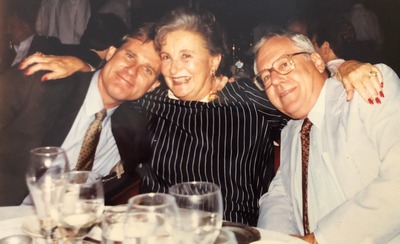Hartman History Series - What Everyone Should Know About John W Davis
The development of a retrospective on the founders of the Robert S. Hartman Institute (the Institute) best starts with a discussion about Dr. John W. Davis. In the development of this article several long-time associates of Dr. Davis spent time to share stories, experiences, and fond memories. Most importantly, they discussed how Dr. Davis’ contributions to the Institute and to the study and advancement of axiology, value theory, and the Hartman Value Profile profited from his leadership.[1]
“Without John Davis there would be no Institute.” All of his long-time associates agreed that John was the soul, leader and some even shared that he was “the Godfather” of the Institute.
Read More

What Everyone Should Know About John W. Davis
By Warren J. Rutherford
Early Beginnings
Born in 1926 in Sybial, West Virginia, John graduated high school and enrolled in West Virginia University, interrupting his studies to serve as a paratrooper in the U. S. Army's 82nd Airborne Division in 1945-6. On his return he started what would become his life-long dedication to philosophy. During his senior year at the University he attended a lecture from a visiting professor from Ohio State University, Robert S. Hartman. On graduation he applied for post-graduate work at Ohio State to study philosophy and became, in his words, “a disciple of Robert S. Hartman,” who had just begun to “develop his formal theory of value based on concept fulfilment.”
“If a thing has all the properties of its concept, then it is good.”
On graduation from Ohio State he enrolled in Emory University to study under Charles Hartshorne for his doctoral studies. Here he met Rem Edwards in 1955-56 when they attended a lecture with Dr. Hartshorne. After passing his doctoral preliminaries at Emory in 1957, he accepted an Assistant Professorship in philosophy at the University of Tennessee in Knoxville. Notably, John received the first Ph.D. in philosophy from Emory University. After arriving in Knoxville, John was also known to host a (6 a.m.) TV broadcast on the History of Philosophy, thus becoming a Philosophy TV personality in the early days of television in the Knoxville area.
The Study of Value
At the University of Tennessee in Knoxville John became a professor and the first department head in 1966 of the newly formed Department of Philosophy. He arranged for a research professorship of philosophy for Dr. Hartman who was then a professor at the National University of Mexico; a research professorship that continued until Dr. Hartman’s death in 1973. John studied value, and taught ethics and value theory before Dr. Hartman came to teach at the University. It was a unique and different perspective. In the words of Rem Edwards, a fellow philosophy professor at UT, John was the premier Hartmanian in axiology and value theory.
Leadership
John consistently was described as balanced and even-keeled – even-handed and neutral, encouraging a diversity of views; a quiet man he never got upset at anything, he was exacting in his language, and was always ready to help another colleague. These traits were illustrated in his balance within the Department Philosophy by recruiting professors in all the areas of philosophy and producing students who were very good in all areas of philosophy, especially in value theory.
John edited two books and essays on Dr. Hartman, one of which he edited with Rem Edwards, concerning two aspects of Hartmanian axiology, one on value theory and the second on the Hartman Value Profile.

Mark Moore, Rita Hartman, and John Davis
Early Days of the Institute
There were several fond memories shared about the early days of the Institute. The Department of Philosophy was housed in McClung Tower on the 1st floor. Dr. Davis convened the first meetings in the Tower’s 12th floor conference room, lugging the coffee urn to the meetings each morning, making the coffee, bringing 4 dozen donuts, with other attendees bringing baked goods.
During the first meeting in 1977 John and Rem Edwards developed the tradition, carried on for many years, of academic meetings with formal papers presented, accompanied by heavy philosophical interactions. After 20 years of the Institute holding it Annual Conference at McClung Tower, with mostly 30 to 40 attendees, the Institute started to look for larger annual conference spaces at hotels adjoining the UT campus. During this first annual meeting John was elected as the Institute’s President, a position he held until 1989, when Mark Moore was elected to succeed him.
The Institute and Influence
John’s influence at the Institute was in his commitment to get others to take Dr. Hartman’s ideas and encourage others to develop more fully formal axiology, value theory, and the Hartman Value Profile. He was able to take Hartman’s ideas and explain them to others in a way that Hartman would struggle to explain himself.
As one associate opined, John was more an influencer than a great philosopher; he was the godfather, he made it all happen. He took Dr. Hartman’s ideas and encouraged professors, researchers, students, and practitioners to do their best work exploring these ideas using the Institute as vehicle, with the publications of the Institute encouraging further exploration of formal axiology, value theory and the Hartman Value Profile; which is the most advanced application of Dr. Hartman’s work. John continued to encourage others to develop the profile further in its practical application to a variety of industries as well as to explore the calculus of the profile.
Relevance to the Institute Today
One of his associates indicated that Dr. Davis wanted to talk about values with a precision that gave it a definition that was not strapped to other pursuits. He thought that John saw axiology as study of values that stands on its own, apart from ethics and theology. John understood what Dr. Hartman was trying to do, encouraging others to talk about the process of valuing and valuation so that you could have a lens through which everything could be examined and discussed.
Perhaps it is said best that Institute members should be inspired to explore and debate formal axiology, value theory, and to continue exploring the different applications of the Hartman Value Profile and the concepts of formal axiology more fully and continue to use the Institute as a clearinghouse for these efforts. John Davis was, and in many respects still can be that referee, keeping the institute moving forward, with his memory as that proverbial gyroscope, anchor, and godfather to the Institute and the proliferation of Dr. Hartman’s work.
__
Dr. Davis died on March 5, 2007 at Oldsmar, FL His obituary notes that he was a professor of Philosophy at the University of Tennessee for 34 years and department head for 22 years. He was an editor and contributor of 8 books and published 20+ articles in value theory, ethics, formal axiology, and American philosophy. He was a co-founder and the first President of the American Society for Value Inquiry. He served as a member of the Council for the Southern Society for Philosophy and Psychology and as President of the Tennessee Philosophical Association, of which he was also co-founder. From 1977 until his retirement in 1991, he was Chair of the Board of the Foundation for Philosophy of Creativity. He was a co-founder, the first President and first Chair of the Board of the Robert S. Hartman Institute for Formal and Applied Axiology.
[1] Interviewed were Steve Bynum, Wayne Carpenter, Rem Edwards, Vera Mefford, and Mark Moore.
